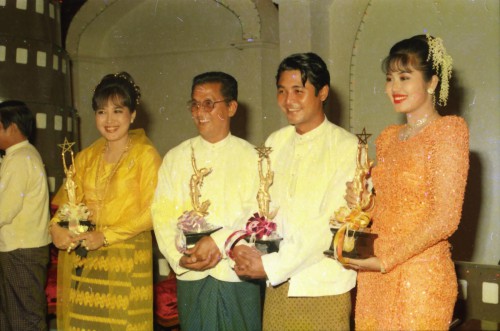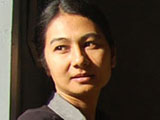Kyaw Thu: The Handsome Actor, The Social Activist
by Khet Mar / March 7, 2013 / No comments
A Burmese heartthrob turns activist and suddenly finds his work banned.

Kyaw Thu (third from the left) won his first Myanmar Academy Award in 1994. Photo courtesy of Khet Mar.
The first thing I can remember about this particular morning in 1984 is that it was a little snowy. At the time, I was a student in 10th grade, walking down the street in front of Bogyoke Aung San Market (formerly Scott’s Market), on my way to English tutoring school. On the street the owner of a shop was putting calendars outside for sale. Perfectly normal, but at the sight of one, I stopped mid-stride. On the cover, a handsome young man wore a white doctor’s coat, and his hair was parted in the middle. When I saw his romantic eyes and his coy, smiling lips my heart raced. This was the first time my heart had ever beat like that from seeing an actor’s picture. I looked for his name at the bottom of the calendar. It was Kyaw Thu.

- In Burma if you want to hear about issues the newspapers can’t talk about, you should go to a tea shop. Tea houses were where I used to meet with other activists, writers and artists, as well as where I built friendships. Within tea houses we talked about Burmese writers, literary trends we noticed, and, of course, politics. This online space attempts to emulate the conversations I enjoyed in Rangoon’s tea houses.

- Khet Mar is a journalist, novelist, short story writer, poet, and essayist from Burma. She is the author of one novel, Wild Snowy Night, as well as several collections of short stories, essays and poems. Her work has been translated into English and Japanese, been broadcast on radio, and made into a film. She is a former writer-in-residence at City of Asylum/Pittsburgh.
Kyaw Thu made his film debut in 1984. A decade later he won his first Myanmar Academy Award for Best Actor in a film called The Foreigner, Miss Shew Htarr. He won his second Academy Award, for Best Director, in 2003. Ever prolific, between 1984 and 2007 he starred in over 200 films and directed another six.
But Kyaw Thu didn’t limit himself to working in cinema. In 2001 he began his social work and founded the Free Funeral Service Society (FFSS) with the writer and director U Thuka. Today, FFSS works to help Burma’s poor, who struggle to pay for basic funeral costs when their loved ones die. Kyaw Thu is now serving as the president of FFSS and as a result of his efforts the organization has expanded to include 80 branches around the country. On average FFSS provides for the burial of 50 individuals every day, and in total, the organization has funded the cost of almost 200,000 burials and funerals.
In 2006, FFSS extended its services, opening the Thukha Free Clinic for the poor in Yangon, which employs approximately 40 volunteer doctors who provide free care for over 200 patients each day. Although FFSS and the Thukha Free Clinic have received tremendous attention and support from the public, they have also been harassed and threatened by government authorities.
In 2007, Kyaw Thu and his wife were arrested for publicly supporting the monks protesting in Burma’s Saffron Revolution. Although he was only detained for 8 days, Kyaw Thu’s HIV/AIDS awareness film, which was released in October 2008, was banned. Since then, all of Kyaw Thu’s creative work has been banned, regardless of whether he performs as an actor or a director.
“In my opinion, I see banning an actor’s work without any proof of a crime as a denial of human rights,” he once said in a video interview.
Kyaw Thu has also been interested in painting since he was a teenager. In 2009, as a celebration of his 50th birthday, he held an exhibition at his home called “Kyaw Thu’s Art Zone.” He also had his “First Breakout” exhibition, a solo show in New York, in May 2012, which featured 26 of his paintings—almost all of which were banned or censored in Burma.
Because of his work with social issues, Kyaw Thu was awarded a prize called “The Artist who Stands for His Fellow People” by the Myanmar community in London in 2009. He was also presented with the Citizen of Burma Award by the Burmese community in the United States in 2011, and the National Endowment for Democracy (NED) Democracy Award in 2012.
Though Kyaw Thu and I often met at art and literary events in Burma, we never had a chance to become close friends. In the past, it was nearly impossible for me to see, let alone talk to, the man because of the crowd of females that surrounded him. When he came to the United States to accept the NED award, we finally had a chance to talk. Now he is only encircled by those who express pride and respect for him and his work.
When I spoke to him, Kyaw Thu said, “I am studying cemeteries while in America so that I can work more emphatically for free funeral services in Burma. Whatever government we have, I will continue my work to help the dead.”
While he was in the United States to accept the NED award, Kyaw Thu also heard good news: Thein Sein’s government would allow him to return to his work in the film industry.
In a video interview, he talked about how he felt.
“It’s good that they’ll let me film again, but I would like to know how they explain not allowing me to do anything related to my film career for five whole years—from 2007 to 2012.”
Kyaw Thu has been asking questions like this since he heard he could film again.
Though I assume that not only him, but also his audience, would like to know the answers to such questions.




